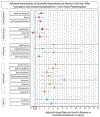The growing dilemma of legalized cannabis and heart transplantation
- PMID: 34006449
- PMCID: PMC10281819
- DOI: 10.1016/j.healun.2021.03.024
The growing dilemma of legalized cannabis and heart transplantation
Abstract
This in-depth review discusses cannabis as it relates to heart transplantation and the growing dilemma of legalization around the world creating disparities in transplant candidacy. One will learn about two of the most common cannabinoids: Δ9-tetrahydrocannabinol (THC) and cannabidiol (CBD). These cannabinoids are metabolized by cytochrome P-450 and P glycoprotein, which are essential for the metabolism of drugs for transplantation, such as calcineurin inhibitors. Addiction, withdrawal, and cannabis use disorder will be reviewed as well as hyperemesis syndrome. Maintaining adequate immunosuppression will depend on a variety of factors, including drug-drug interactions, pharmacokinetics of cannabinoids and chronicity of cannabis usage. These drug interactions are further confounded by varying concentrations of cannabis products available at medical dispensaries. One will also learn about the outcomes of transplant recipients using cannabis such as graft failure and the risk of infections. Although more research is needed to establish transplant guidelines, the available data is concerning and fairness in organ distribution should not vary by transplant program or institution.
Keywords: cannabis; heart failure; heart transplantation; substance abuse; transplant rejection.
Copyright © 2021 International Society for Heart and Lung Transplantation. Published by Elsevier Inc. All rights reserved.
Figures


References
-
- Mehra MR, Canter CE, Hannan MM, et al.: The 2016 International Society for Heart Lung Transplantation listing criteria for heart transplantation: A 10-year update. J Heart Lung Transplant 2016;35:1–23. - PubMed
-
- Chih S, McDonald M, Dipchand A, et al.: Canadian Cardiovascular Society/Canadian Cardiac Transplant Network Position Statement on Heart Transplantation: Patient Eligibility, Selection, and Post-Transplantation Care. Can J Cardiol 2020;36:335–56. - PubMed
-
- DeFilippis EM, Givertz MM: Marijuana use and candidacy for heart transplantation. J Heart Lung Transplant 2019;38:589–92. - PubMed
-
- Page RL 2nd, Allen LA, Kloner RA, et al.: Medical Marijuana, Recreational Cannabis, and Cardiovascular Health: A Scientific Statement From the American Heart Association. Circulation 2020;142:e131–e52. - PubMed
Publication types
MeSH terms
Substances
Grants and funding
LinkOut - more resources
Full Text Sources
Other Literature Sources
Medical

